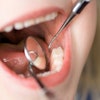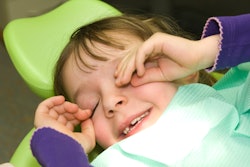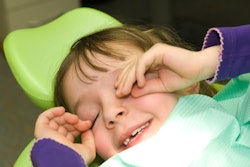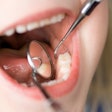A 5-year-old patient with a history of anxiety was hospitalized with a feeding tube after refusing to eat, drink, or even swallow saliva for a week following general anesthesia for dental surgery. The case report was published on October 8 in Case Reports in Pediatrics.
The child, who had a history of anxiety but was otherwise healthy, was discharged from the hospital after eight days. This case report emphasizes the importance of considering a patient’s anxiety levels and providing comprehensive psychological support to manage postoperative anxiety and pain after procedures, the authors wrote.
“This case highlights the potential for severe functional disability following comprehensive dental restorations in children, manifesting as an extreme refusal to swallow even saliva,” wrote the authors, led by Frances Scheepers of the University of British Columbia, in Vancouver, British Columbia, Canada.
A 5-year-old requiring full-mouth dental restorations
A 5-year-old with no medical or developmental concerns underwent general anesthesia for tooth extraction, multiple fillings, and placement of crowns. Propofol, fentanyl, and rocuronium were used as anesthetic agents that were delivered intravenously followed by nasal intubation and sevoflurane maintenance. Ondansetron, dexamethasone, and analgesics were administered preemptively, the authors wrote.
The anesthesia and the dental procedure proceeded without complications. The child was discharged in stable condition and reported no pain, coughing, or bleeding, they wrote.
Two days after the procedure, the child refused to eat, drink, or swallow saliva, so the patient was taken to a hospital emergency room. Right after the dental procedure, the child could swallow. After ingesting liquid analgesics, the child cried in pain and then refused to take anything orally.
When the child arrived at the emergency room, they were afebrile, spitting out saliva, had dark urine, and showed signs of moderate dehydration. The child refused oral rehydration therapy, the authors wrote.
A neck soft-tissue x-ray showed no deep space infections or dislodged dental materials, and routine blood work showed no significant abnormalities. The child was admitted to the hospital for management of dehydration secondary to dental procedure pain.
The patient was given IV fluids and acetaminophen. Anesthesiology; ear, nose, and throat; and dentistry specialists were consulted. The team suggested the patient wasn’t swallowing due to postoperative pain and anxiety. Psychologists and child life specialists discovered the child had a history of situational anxiety, as well as significant fear regarding the dental procedure, the authors wrote.
Despite efforts from the child’s parents and medical professionals, the patient refused to eat or drink anything, forcing them to place a feeding tube. A nasopharyngoscopy revealed the child had a normal oropharynx and hypopharynx, an intact gag reflex, and no nerve injury, they wrote.
With continued nutritional support, encouragement to sip liquids, and psychological support, the child gradually began eating, drinking, and speaking normally. The feeding tube was removed, and the child was discharged after eight days. The child had no dental or other complications or problems after discharge, the authors wrote.
Anxiety and pediatric patients
Prior to pediatric dental procedures, it may be beneficial to screen for anxiety. Taking this step may help identify children at higher risk for complications such as excessive pain and functional impairment. Additionally, involving psychological support services sooner rather than later may improve outcomes by dealing with any potential underlying anxiety and fear, they wrote.
“This case represents an extremely rare clinical scenario of complete refusal to swallow, including refusal to even swallow saliva, following comprehensive dental rehabilitation in a pediatric patient,” Scheepers and colleagues wrote.




















